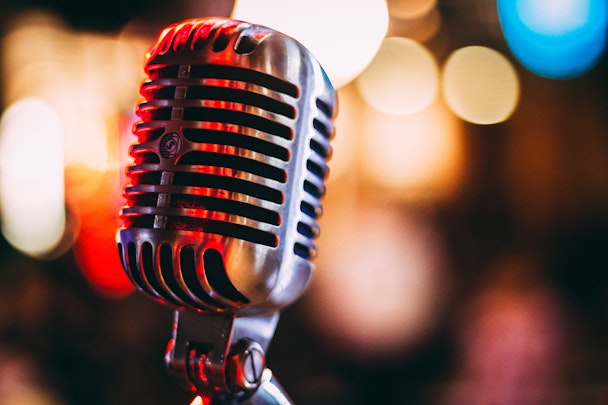Where is the next big podcast acquisition coming from?
Programmatic has come to podcasting. The lo-fi appeal of the podcast ad read is being augmented by tech that allows for the contextual placing of audio pre-reads. Inspired by the tech, new players are pushing into the market.

Can podcasting escape the grasp of huge spenders like Spotify?
While the appeal of the shows themselves remain the same, the audio format can now be monetized at scale. It is what advertisers have long claimed is necessary for the podcast to grow as a major part of the media mix – but it seems to be tipping the scales toward big incumbents that will receive the lion’s share of the ad revenue.
Meanwhile, podcast distribution is becoming broader and far more sophisticated.
A recent acquisition by iHeartMedia will see its suite of podcasts automatically translated into other languages using synthetic voices. On the face of it, it conflicts with the direct host-audience relationship that underpins the initial growth of podcasts – but it also allows for far more monetization in different territories.
Conal Byrne, chief executive officer of iHeartMedia Digital Audio Group, says: “Being able to easily offer our podcasts in other languages, in the talents’ unique style, will be an awesome and innovative way to grow market share in the global marketplace.”
That is just one investment in the burgeoning podcast advertising space and, while most of the other acquisitions are around more traditional adtech and measurement tools, it speaks to advertiser hunger for the audio format.
Spotify has been driving the vast majority of investment in the space. Having acquired Megaphone in 2020 in order to allow potential partners to repurpose existing audio content, the streaming service has continued investing in podcast adtech. A spokesperson says: “With the integration of Whooshkaa’s broadcast-to-podcast technology into Megaphone, radio broadcasters will be able to more easily and quickly turn their existing audio content into a podcast and access Megaphone’s industry-leading, differentiated suite of tools and technology.”
In addition to Whooshkaa, it also announced the acquisitions of Gimlet, Parcast, The Ringer Podz, Findaway and Locker Room over the past few years.
Since then it has splashed out on a number of other tools. Its most recent acquisition saw it acquire both Chartable and Podsights in February 2022, tools that allow for the insertion of tags into audio content that enables dynamic ad insertion and tracking of those ads’ success. At the time, Spotify stated: “These tools will make it easier for publishers to turn audience insights into action and expand their listenership while ultimately growing their businesses.”
But its acquisitions contribute to a growing sense that podcasting has had its uniqueness stripped away, a context collapse that hands too much power to platforms such as Spotify. For publishers and advertisers looking to avoid the pitfalls of platform overdependence, other acquisitions hint at alternative solutions.
Off-platform
Sarah Toporoff is publisher manager at Podinstall, which is a web platform for podcasts. She believes much of the investment in podcast adtech is recognition that the industry is trying to pull itself away from the bigger platforms that seek to control it, in much the same way that platforms like Google ended up controlling web2.
She says: “Your biggest potential growth platform for your podcast audience, it’s not Apple, it’s not Spotify, it’s Google Chrome. It’s Firefox. It’s your own online platforms, because if you look at the history and the structure of the internet, it was first optimized for text, then optimized for image, and nowhere did audio find its place online.”
It’s a philosophy being embraced at other platforms. Acknowledging that the ‘podcast’ format has outgrown its origins as an RSS-distributed audio format, Acast’s vice-president of product Matt MacDonald says: “We know monetization will never be a ‘one-size-fits-all’ solution, so we’ve launched Acast+ to offer podcasters of all sizes a suite of tools that can be mixed and matched however they like.”
Acast+, which launched last year, was the first of a number of Acast launches. In addition to its incubator program, the podcast platform has been focusing on broadening the appeal of podcasts – which means getting them off prescriptive, specific platforms. Jack Preston, director of Acast Creative in the UK and US, says: “It’s undervalued compared to lots of visual mediums, but I do think things are changing. Over the last decade, the proliferation of smart speakers, voice search and podcasts are making sound much, much more relevant. And brands are having to adapt to that.”
So as audio is broadened – in format, in language and in distribution – where is the next big podcast acquisition coming from?
In the wake of Epic Games’ shock acquisition of Bandcamp, the reality is that audio is big business and competition for audio platforms and capabilities is hotting up. And, just as that acquisition demonstrates, there are an awful lot of sleeping giants waiting to be woken.
The need to widely distribute audio content means that on-site players are a likely target for acquisition. As with the Podinstall example above, the benefit for publishers is that it breaks audio out from the prescriptive ecosystems of Spotify and Apple, in addition to providing proprietary data. In that sense Soundcloud, which has previously been the target of acquisition attempts from Twitter for $1bn, could well be among the next platforms to be sold. At the time, the sale was reportedly stymied by copyright infringement issues on Soundcloud – but with podcasting making up a greater proportion of the overall audio space, it could well be that Soundcloud would be attractive for that reason alone.
Beyond distribution, there are many podcast adtech companies that are well-placed to take advantage of the rise in dynamic ad insertion. Figures from the Internet Advertising Bureau (IAB) demonstrate that dynamically-inserted ads overtook baked-in ads as the most popular format in 2020; that proportion is only likely to have increased since. That makes audio adtech companies that can marry distribution and advertising valuable targets for acquisition; in 2020 SiriusXM bought distribution and measurement platform Simplecast with the express purpose of combining its capabilities with its adtech subsidiary AdsWizz.
So while the content acquisitions like The Joe Rogan Experience capture the most headlines, the more transformative purchases in the podcasting space this year will be those that broaden the format beyond individual platforms, and return a semblance of accessibility to an increasingly formalized and siloed space.

